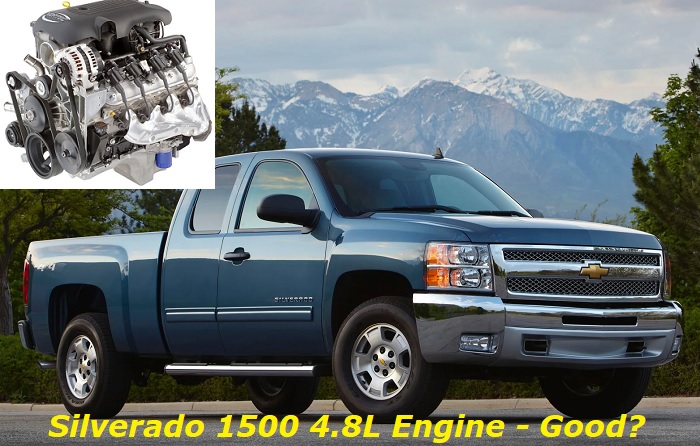The 4.8-liter engine is a small-block V8 built by General Motors between 1999 and 2013. Before the 5.3-liter V8 Vortec replaced it, the 4.8-liter went through three generations. The LR4 between 1999 and 2006, LY2 from 2007 to 2009, and L20 from 2010 to 2013. Although Chevrolet Silverado utilized the 4.8-liter V8 throughout its three generations, our focus is the newest iteration, the L20 that powered the 2013 Chevrolet Silverado 1500.
The Vortec V8 is an excellent entry-level V8 with great airflow throughout, enabling it to strike a perfect balance between performance and fuel efficiency. The engine offers exemplary refinement combined with the Silverado's muscular build to deliver top-level performance.
Thanks to the quiet features built into the Vortec V8 and complemented by the improved engine cradle and mounting system, this engine produces minimal vibrations. This means the driver and passenger compartment experience little to no vibrations.

Key features and my opinion about the engine
- Production years:1999-2017
- Average lifespan of Vortec 4800:220,000-280,000 miles
- Fuel supply type:port injection
- Power range:255-302 hp
- Fuel efficiency:bad
- Engine block material:cast-iron
- Engine reliability score:high
- The most common problems:weak sensors, fuel pump problems, cooling system issues, oil consumption.
The 2013 Chevrolet Silverado 1500
Despite its old design, the 2013 Chevy Silverado is one of the most reliable full-size trucks to buy in 2022. Thanks to its wide range of usable body styles and excellent performance, it's a worthy contender in its segment. Its good highway manners also make the Silverado 1500 a perfect vehicle for work and family hauling.
Last revised in 2007, the Silverado 1500 compares competitively against its top rivals of the time. And although many Ford and Ram trucks were already redesigned, the Silverado presented a real challenge. The truck features commendable comfort and safety features.
The Chevy 4.8L V8 Engine Features and Specs
The Chevrolet Silverado 4.8-liter Vortec 4800 features a mounting arrangement and enhanced cradle, making it a force to be reckoned with. These features are built to minimize chassis vibrations passing into the cabin.
6 Best Features of the Chevrolet 4.8L V8 Engine
- Deep Skirt Structure Design
The Chevy 4.8-liter V8 powerhouse has its tube block mated with the turning arrangement. The deep skirt structure build allows buyers to increase their Silverado strength.
- Polymer Glaze on Pistons
Due to the up and down movement of cylinders, engines produce notorious abrasions and vibrations. However, thanks to the glaze of polymer on this 4.8-liter Vortec V8 designed to minimize wear and tear, there's minimal vibration from the engine. These factors also reduce the noise produced by the motions within the engine. All these elements provide a quiet engine operation that significantly increases its lifespan.
- High-Flow Tub
The 4.8-liter Vortec V8 has high-flow tub heads and a Valvetrain, a cathedral-shaped tube that takes in air via specific ports. This element enhances airflow at low and high rpm torque.
- Electronic Throttle Control
ETC or Electric Throttle Control is an enhanced electronic throttle switch. This feature is built to ensure there's no mechanical connection between the throttle body and the gas pedal. There is, however, a pedal that sends pointers to the motor.
- 58X Ignition System
The Chevrolet 4.8-liter V8 has a 58X ignition system to give the engine perfect ignition timing. Also called 58X crankshaft ring, this element sends precise data to the crankshaft placement while on revolution. With the data provided, the Chevrolet 4.8-liter V8 can perfectly manage its unit to adjust the ignition timing.
That being said, the 4.8-liter V8 comes with long-lasting spark plugs and coolant that increase the unit's lifespan to match that of the 5.3-liter Vortec V8 closely. The only notable difference between these two is that the 4.8-liter has a small crank stroke.
- E85 Flex-Fuel Capability
E85 is a clean-burning alternative fuel produced domestically with 85 percent ethanol and 15 percent alcohol. Ethanol is reusable energy that emits fewer greenhouse gasses during combustion. The power can be extracted from various feedstocks, including corn and wheat stalks. It can also be produced from forestry and waste from agricultural activities.
The Chevy 4.8L Liter V8 Specifications
The Chevrolet L20 replaced the LY2 generation in 2010, becoming the last offering in the GM 4.8-liter V8 engine family. The L20 was upgraded to feature variable valve timing and flex-fuel technology. The 4.8L Gen IV V8 Small Block engine featured a longitudinal design and displaced 4807cc. Other specs of this powerhouse include a compression ratio of 8.8:1, an overhead valve configuration with two valves per cylinder, and a sequential fuel injection system.
The Chevy 4.8-liter L20 has a bore diameter of 3.780 in., which can be increased to 3.898 in. However, this will weaken the cylinder walls. The block is potent with small bore size.
4 Common Problems with The Chevy 4.8L V8 Engine?
- Faulty Intake Manifold and Gasket Leading to Air Leaks
One of the common issues with the Chevy 4.8-liter V8 is with the intake manifold and the gasket. The intake manifold controls the air going into the engine and distributing it to the cylinders. Since the manifold is made of plastic, it can crack or warp from excessive heat or torque. On many occasions, these problems arise from wear and tear as they are located next to the motor where there's extreme heat production.
The gasket wasn't built very well. And although gaskets will always deteriorate, this one wears out relatively fast. A faulty manifold and gasket cause air leaks before reaching the engine. As a result, the motor will experience insufficient air supply, leading to inadequate cooling. These factors will eventually lead to serious performance problems.
- Engine Knock Sensor
The intake knock sensor is located on the intake manifold. It senses vibrations produced by the engine. As the name suggests, the engine knock sensor is responsible for sensing and preventing the engine from knocking. When this happens, you'll likely hear a knocking noise from your Chevy Silverado 4.8-liter V8.
Fuel combustion takes place in pockets - like in a row of fireworks. Pre-detonation happens when one pocket ignites before its turn. When a knock occurs, it sends vibrations throughout the cylinder, increasing cylinder pressure.
When the knock sensor detects a pre-detonation, it alters the ignition and engine timing to prevent the engine from knocking. On the Chevy Silverado 4.8-liter V8, the intake knock sensor is known for its notorious failure that causes the check engine lights to illuminate. When your truck's engine knock sensor is faulty, it'll automatically alter ignition timing, although there are no issues that need fixing. As a result, your truck will experience some severe performance problems.
- Faulty Water Pump
A cooling system is a huge determinant of the engine's performance. A water pump is a critical component of this system. It is responsible for the seamless flow of coolant throughout the cooling system. Heat is a huge threat to a motor's life expectancy. That being, a faulty water pump is a problem that requires immediate action as soon as it is detected.
Although this is not a common problem with low-mileage Chevrolet 4.8-liter V8 engines, many of these trucks available today are high mileage. That means they are prone to experiencing faulty water pumps, causing cooling system failure. A faulty water pump is a problem common with trucks with over 150,000 miles on the odometer.
- Fuel Pump Failure
The Chevrolet 4.8-liter V8 uses an advanced fuel injection system, a sequential multi-port system, which utilizes a fuel pump to supply the injectors with fuel. The fuel is then sprayed to the intake ports. The fuel pump is located in the gas tank. Besides sending fuel to the injectors, it is also supposed to keep the fuel under the required pressure. Due to the high pressure required in the injectors, the fuel pump will always be highly stressed when the engine is running.
A control module failure means there is no sufficient fuel going into the injectors, or it cannot maintain the required pressure. When there is not enough fuel going into the injectors, the engine tends to run on insufficient fuel. Additionally, when the pressure is too low, the injectors will not be able to spray enough gasoline, which causes the engine to misfire.
How Long Can the Silverado 1500 4.8L V8 Engine Last
The Chevy 4.8-liter V8 Vortec 4800 is a formidable workhorse, a full-fledge engine well-known for its incredible performance and reliability. The few problems mentioned here aren't common with low-mileage examples. And although they will start showing when the odometer reaches 150,000 miles, with the proper maintenance and regular oil change, this Chevy 4.8-liter will push your Silverado to over 200,000 miles without noticeable issues. Being a 2013 truck, several examples on the road have gone past 300,000 miles.
Final Thoughts
Despite a few limitations, the Chevrolet 4.8-liter V8 is highly reliable. Even after exiting the market in 2013, the Silverado trucks powered by this engine are among the most dependable vehicles in the used car market. The engine offers excellent performance and produces minimal vibrations, thus making the Silverado quite comfortable to drive.
Just like any other mechanical device, regular maintenance can save you a lot of repair costs and, as a result, give you over 250,000 miles. Despite mileage on the odometer, the pros of this Chevy 4.8-liter V8 outweigh the cons.
About the authors
The CarAraC research team is composed of seasoned auto mechanics and automotive industry professionals, including individuals with advanced degrees and certifications in their field. Our team members boast prestigious credentials, reflecting their extensive knowledge and skills. These qualifications include: IMI: Institute of the Motor Industry, ASE-Certified Master Automobile Technicians; Coventry University, Graduate of MA in Automotive Journalism; Politecnico di Torino, Italy, MS Automotive Engineering; Ss. Cyril and Methodius University in Skopje, Mechanical University in Skopje; TOC Automotive College; DHA Suffa University, Department of Mechanical Engineering






Add comment